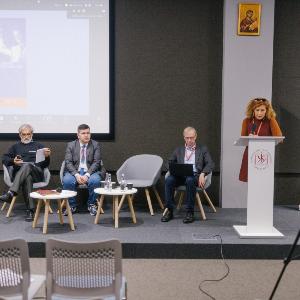Event report: First MHC annual conference in Lviv, 6-7 October 2025
22.10.2025
Historians from nine countries gathered on-site and online to discuss “The Politics of Nazi Accusations: The Soviet Union and anti-Soviet Nationalisms in the Cold War”
22.10.2025
Historians from nine countries gathered on-site and online to discuss “The Politics of Nazi Accusations: The Soviet Union and anti-Soviet Nationalisms in the Cold War”

© UCU Lviv
Why do Russia’s leaders today depict Ukraine’s president Volodymyr Zelensky, a man who lost relatives in the Holocaust, as “Nazi”? What is the tradition of Nazi Accusations after the Second World War? Which role did they play during the Cold War? These were some of the questions underlying the topic of this year’s conference. It took place October 6-7th at the Ukrainian Catholic University (UCU) in Lviv.
In his welcome address Taras Dobko, UCU rector, referred to the ongoing Russian attacks against his city by stressing that this war is not only a confrontation “between armies, but also between narratives and values”. Fact-based scientific work, Dobko said during the opening, should enable everybody to recognize and reject false “Nazi accusations” directed against Ukraine.
LMU professor Martin Schulze Wessel, the German MHC co-director, described Vladimir Putin’s war against Ukraine as a “war of annihilation”. Since Ukraine defends Europe’s security and freedom, “we are more dependent on Ukraine and above all the Ukrainian army than Ukraine is dependent on us”. In this context, we should keep in mind how Soviet and Russian propaganda “made use of (the former Ukrainian nationalist organization) OUN and its leader Stepan Bandera in order to discredit any national aspirations in Ukraine”.
Maximilian Rasch, Acting Chargé d’Affaires of Germany, joined the participants for the opening reception and emphasized the relevance of conference because of Russia’s use of pseudohistorical narratives to justify war crimes and aggression: “When we talk about history, this forms a basis for all narratives now and in the future.”
During the two-day conference, participants discussed various aspects of the topic in eight panels. The focus here was on Ukraine, but the conference also addressed Soviet instrumentalisations of the Nazi accusation in other contexts, for example to legitimise Soviet interventions in Eastern Europe. They explored how Soviet publications used the accusation of fascism for constructing enemy images of anti-Soviet movements, examined contradictions in Soviet narratives and the impact of these narratives on both domestic and international audiences. An important topic was also the complex interplay between propaganda, memory, and justice in the context of war crimes investigations in the Soviet Union and in the West. Here papers addressed the role of émigré communities, the international dimension of Soviet disinformation, and the legacy of these historical conflicts in shaping contemporary perceptions and political realities.